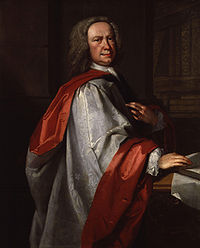Johann Christoph Pepusch
hideThis article has multiple issues. Please help or discuss these issues on the talk page. (Learn how and when to remove these template messages)
|
show This article may be expanded with text translated from the corresponding article in German. (November 2019) Click [show] for important translation instructions. |

Johann Christoph Pepusch[needs IPA] (1667 – 20 July 1752), also known as John Christopher Pepusch and Dr Pepusch, was a German-born composer. He spent most of his working life in England.
Early life[]
Pepusch was born in Berlin. He studied music theory under Martin Klingenberg, cantor of the Marienkirche in Berlin.[1] At the age of 14, he was appointed to the Prussian court where he gave music lessons to the future Frederick William I of Prussia. In about 1700, he settled in England.[2]
Career[]
In 1726, Pepusch founded The Academy of Vocal Music with others; in around 1730–1, it was renamed The Academy of Ancient Music. In Joseph Doane's Musical directory for the year 1794, the founding of the Academy is discussed. On page 76, Doane states:
In the year 1710 (memorable for Handel’s first appearance among us) a number of the most eminent composers and performers in London [agreed] to concert a plan of an Academy for the study and practice of Vocal and Instrumental Music, which was no sooner announced than it met the countenance and support of the principal persons of rank. Among the foremost in this undertaking were Mr. John Christopher Pepusch, Mr. John Earnest Galleard, an excellent composer and performer on the Oboe, Mr. Bernard Gates of the Queen’s Chapel, Henry Niedler, etc.[3][4]
— Joseph Doane
Pepusch remained Director of the Academy until his death in 1752, whereupon he was succeeded by Benjamin Cooke. Pepusch died in London.
During a period of twenty years, Pepusch directed the musical establishment at Cannons, a large house northwest of London. He was employed there by James Brydges, 1st Duke of Chandos. For a few years he worked alongside George Frideric Handel, who had a role described as composer in residence. Both men were at Cannons in 1717/18.[2]
Pepusch is best known for his arrangement of the music for The Beggar's Opera (1728) — to the libretto of John Gay. He composed many other works, including stage and church music as well as concertos and continuo sonatas.
References[]
- ^ Tim Eggington (2014). The Advancement of Music in Enlightenment England: Benjamin Cooke and the Academy of Ancient Music. Boydell & Brewer Ltd. pp. 15–. ISBN 978-1-84383-906-4.
- ^ Jump up to: a b Julie Anne Sadie (1998-01-01). Companion to Baroque Music. University of California Press. p. 300. ISBN 978-0-520-21414-9.
- ^ Doane, Joseph (1993). A musical directory: for the year 1794. London: Royal College of Music. OL 21788685M. published by R. H. Westley; and sold by music-sellers Longman & Broaderip; Smart; Bland; Betts; Fentum.
- ^ OpenLibrary.org. "Joseph Doane". Open Library. Retrieved 2019-11-10.
Sources[]
- Baker, C. H. Collins and Baker, Muriel I. (1949) The Life and Circumstances of James Brydges, First Duke of Chandos Oxford : Clarendon Press
External links[]
| Wikimedia Commons has media related to Johann Christoph Pepusch. |
- Free scores by Johann Christoph Pepusch at the International Music Score Library Project (IMSLP)
- Digitized images of Old English Songs containing works by Pepusch, housed at the University of Kentucky Libraries Special Collections Research Center
- 1667 births
- 1752 deaths
- 18th-century classical composers
- German Baroque composers
- Burials at Brompton Cemetery
- Fellows of the Royal Society
- German classical composers
- German male classical composers
- German music theorists
- German opera composers
- Male opera composers
- Members of the Academy of Ancient Music
- Members of the Royal Society of Musicians
- 18th-century German composers
- 18th-century male musicians
- German composer stubs